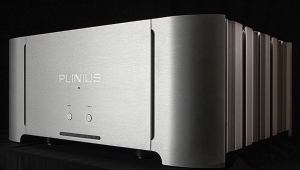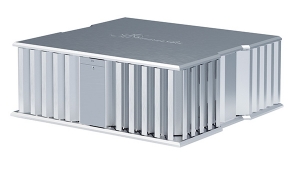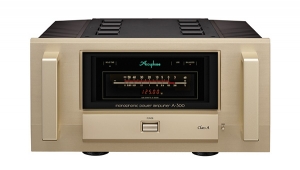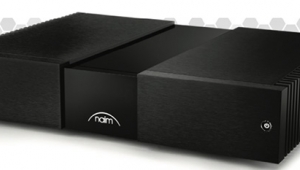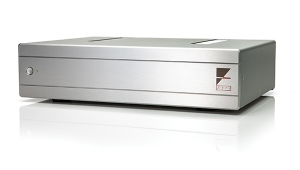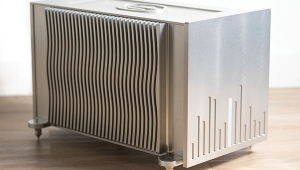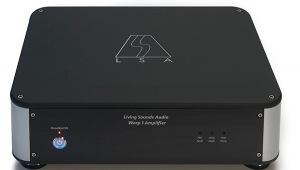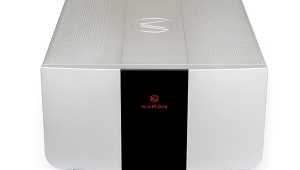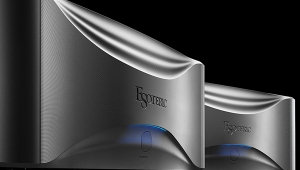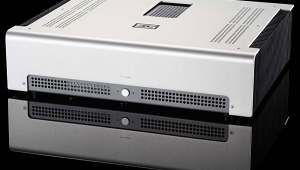| Columns Retired Columns & Blogs |
Soulution 710 power amplifier
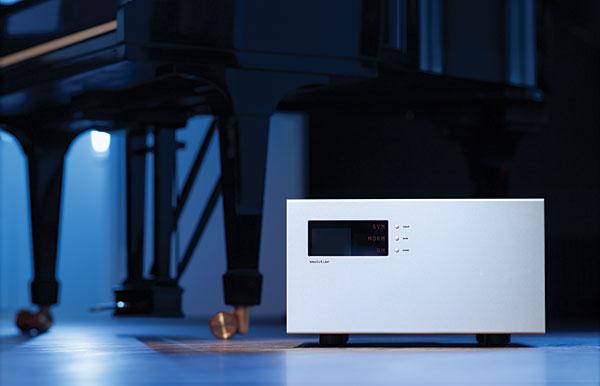
That is not a typo. The company is named Soulution—as in soul commitment to designing and manufacturing the finest audio gear it knows how, as in souldiering on in the face of skeptics who can't imagine why a power amplifier that puts out 130Wpc into 8 ohms or 260 into 4 ohms should cost $45,000, or weigh as much as a small pickup truck.
All of that is old news for some readers. For the rest, Soulution is the unlikely offshoot of Spemot, a 56-year-old company based in Dulliken, Switzerland, that manufactures specialty electric motors for the automotive industry (BMW, Volkswagen) and for use in power tools, industrial air-conditioners, and what appear to be personal grooming devices for farm animals. Spemot also manufactures a kitchen appliance—an ice-maker of sorts used by professional chefs who specialize in "molecular gastronomy." It can make mousse from lox—but that's a discussion for the Food Network.
There's an old joke: "How do you end up with $2 million in high-performance audio? Start with $4 million!" In the case of Spemot's principals, Cyrill Hammer and Roland Manz, their long voyage in these treacherous waters seems to be paying off. Spemot's ultra-expensive, highly engineered audio products, first marketed in 2006, have found a devoted following, first among well-heeled Asian and German audiophiles and now throughout the world.
Longtime passionate audiophiles, Hammer and Manz had, since 1997, imported to and distributed in Switzerland the Audiolabor electronics from Germany, among other brands (Turntable maven Helmut Brinkmann was one of Audiolabor's founders). When Audiolabor became inactive, Hammer and Manz hired its chief audio designer, Christopher Schürmann, who, over a five-year period, began implementing Hammer and Manz's mandate to design cost-no-object components, eventually to their satisfaction.
While Soulution is a relatively young company, it's built on the foundation of a long-successful one that will stand behind and support the product. That's good to know when you're forking over $45,000 for a moderately powered solid-state amplifier—though of course we all know of amps that cost over $100,000 and output but a few watts.
Boy, you're gonna carry that weight
It took three people to move the 176-pound Soulution from its crate to my Finite Elemente Pagode stand and, at the end of the review period, three others to get it from there into the trunk of John Atkinson's car. Compounding the weight problem were the rather sharp edges of the integral handles on the Soulution's rear panel.
The look of the boxy, matte-gray case is retro-industrial elegant, enhanced by the lack of any visible fasteners on any surface. No doubt the Spartan look won't appeal to everyone, but I found it refreshingly understated in a world filled with blue LEDs and gleaming brushed aluminum.
A relatively small orange display on the front panel monitors settings made via the three small buttons to its right, and alerts the user to any fault conditions. (The 710 includes circuits to protect it from clipping, overcurrent, and overheating.) The company name appears below the display, almost as an afterthought, in small letters that look almost typewritten. You can choose balanced or single-ended operation, as well as a remote turn-on option when the 710 is paired with a Soulution preamp. Rear-panel buttons let you choose the startup input and the brightness of the front-panel LEDs.
The rear panel features single-ended WBT RCA and Neutrik balanced XLR inputs for each channel, as well as substantial winged speaker binding posts, access to which is somewhat limited by the handles. Access is also limited to the IEC inlet, which is mounted at a 90° angle to the rear panel on a protrusion that contains the cooling fan. Soulution provides a proprietary AC cord, but if you have a favorite of your own, it might not fit, particularly if it's too stiff to bend at an acute angle.
What's inside
Much of the 710's weight is accounted for by two 1000VA toroidal transformers and rectifiers mounted on bus bars of solid copper, to which are connected the capacitors, which supply almost 250,000µF of storage capacity. More weight comes from the heat-dissipating aluminum baseplate, almost half an inch thick, and the rest of the thick, rigid chassis.
This dual-mono, dual-differential design has independent amplifier boards and power supplies. The design architecture emphasizes short signal paths. The inputs are buffered by a stage with a low output, followed first by an "error amplifier," then by a high-bandwidth, zero-feedback, "fixed-gain buffer" that amplifies the voltage by a factor of 20. That feeds the current amplifier stage, which uses 14 temperature-controlled power transistors affixed to a 6mm-thick copper bus bar, and is capable of delivering 60 amps of peak current. Because of its ultralow specified output impedance of 1 milliohm, the 710 could theoretically provide peak current greater than 200 amperes (!), but it's monitored and limited to 60 amps. Another solid bus bar transmits the output to the speaker terminals.
Tight control of the 710's operating temperature is a critical factor in its overall stability, consistency, and ultrawide bandwidth of DC–1MHz. The design of the Soulution 710 is modular and ultra-high-tech, and makes use of modern construction and manufacturing techniques; few wires are evident in the compact, complex layout. That's what $45,000 gets you physically.
The graphs in the 710's instruction manual illustrate its exceedingly low noise floor: –140dB from 20Hz to 20kHz (it's actually lower throughout most of the audioband), with but a few ultranarrow spikes, the major one at 60Hz and registering a level of –120dB. The 710's frequency-response plot is essentially flat from 20Hz to 100kHz, with a rise of 0.025dB at the top. The claimed frequency response is DC–1MHz, –3dB. The THD+noise vs power (8 ohms) is a mind-bogglingly low 0.00075% up to around 115W, where it rises sharply to a still-negligible 0.1% at the rated 130W or 260W into 8 ohms.
- Log in or register to post comments




